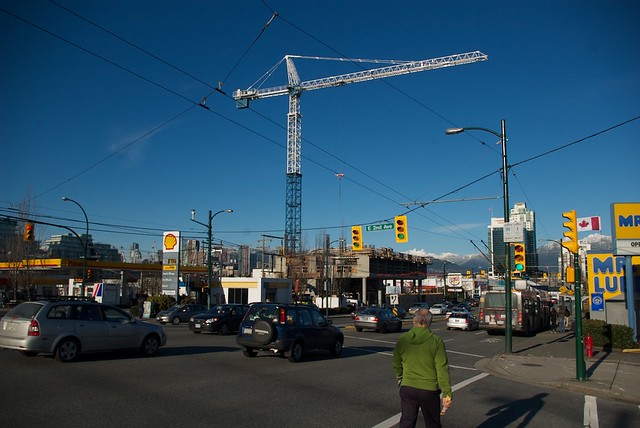
The new plan for the redevelopment of Little Mountain neighbourhood in East Vancouver has been released to the public. The plan calls for wholesale gentrification of the Riley Park-Little Mountain neighborhood. The 15-acre site that previously held 224 units of social housing will be replaced with 2,000 units of market condominiums.
In exchange for a zero-percent increase in the amount of affordable housing on the site, the neighborhood will be transformed by luxury condos and retail, putting upward pressure on local property values. Like in other working-areas of Vancouver, this new high-end development will usher in rent increases, more renovictions and even more demolitions.
In Vancouver, there are on average two home demolitions per day. The Little Mountain plan ensures that the rate of demolitions will be particularly high in the Riley Park area. In addition to the demolition of Little Mountain social housing, the city has its sight set on demolishing all single-family homes at the north-east corner of the Little Mountain property.
Even though evictions and displacement are systemic throughout Vancouver, the city has not conducted a social impact study to understand the possible social effects of these demolitions and mega-projects. When asked at Thursday’s press conference whether the City plans to conduct such a study, Senior Planner Ben Johnson said “No,” claiming that there are no impacts because “homes are going for $1million in the neighborhood.” According to the city, the renters who make up large part of Little Mountain, Riley Park, Kensington-Cedar Cottage, Sunset, and Mount Pleasant are not part of the equation.
The new plan announced by the private developer, Holborn Group, consists of sixteen towers of luxury condominiums. There are nine towers planned at ten to fourteen stories, while the rest of the density is spread out between four to nine stories. It is assumed that Holborn bought the property from the provincial government for a price fixed to existing levels of zoning, at four stories, while committing to replace the 224 units of social housing.
This “one-for-one” deal is a coup for Holborn because on a mega-project of this size, the city would normally apply its mega-project housing policy requiring that 20% of all units be social housing. The planned 2,000 units would normally accompany at least 400 units of social housing, but in this case the Memorandum of Understanding (MOU) signed between the City and the Province assures Holborn that only 224 units are necessary. Furthermore, low-income tenants have been forced into the precarious waiting room of history. The first phase of the project will now not be completed until 2017 at the absolute earliest, even though all replacement housing was promised to be completed by 2010 at the latest.
When Holborn bought Little Mountain, the land was zoned for four stories. Holborn claims to have paid an above-market rate because the Province promised that the land would be upzoned in the future to allow more condo units. Of course, rezoning is a City power, outside the Province’s jurisdiction. If the Province indeed made a guarantee to Holborn that the land would be rezoned, then the Province was on the one hand attempting to undermine the local community planning process (including the existing Riley Park Community Vision), and on the other hand seems to have misrepresented the Province’s powers to Holborn. However, there is no reason to feel sorry for Holborn. Holborn has more than enough lawyers to know exactly what they were getting into. The most likely scenario is that the Province and Holborn colluded to strong-arm the City and undercut local planning processes.


